Sometimes, when it's hot and sunny in the summer months, we find ourselves sitting in a parking lot with the AC blasting while the car is idle. Or perhaps the same thing occurs when stuck in bumper-to-bumper traffic.
In either case, it's possible that running the AC like this could cause your car to overheat. But you may still be wondering why this phenomenon occurs. That's where we come in to clear things up.
Cars often overheat when the AC is on due to faulty components, such as bad radiators, AC compressors, coolant levels, fans, etc.
You'll notice an overheating problem if steam comes out of the hood or the temperature gauge rises, among other signs.
Keep reading to learn more about the different parts that can overheat a car when the AC is on. We'll clear up misconceptions, answer frequently asked questions, and get to the bottom of what you can do if you find yourself with an overheated car with the AC on in traffic.
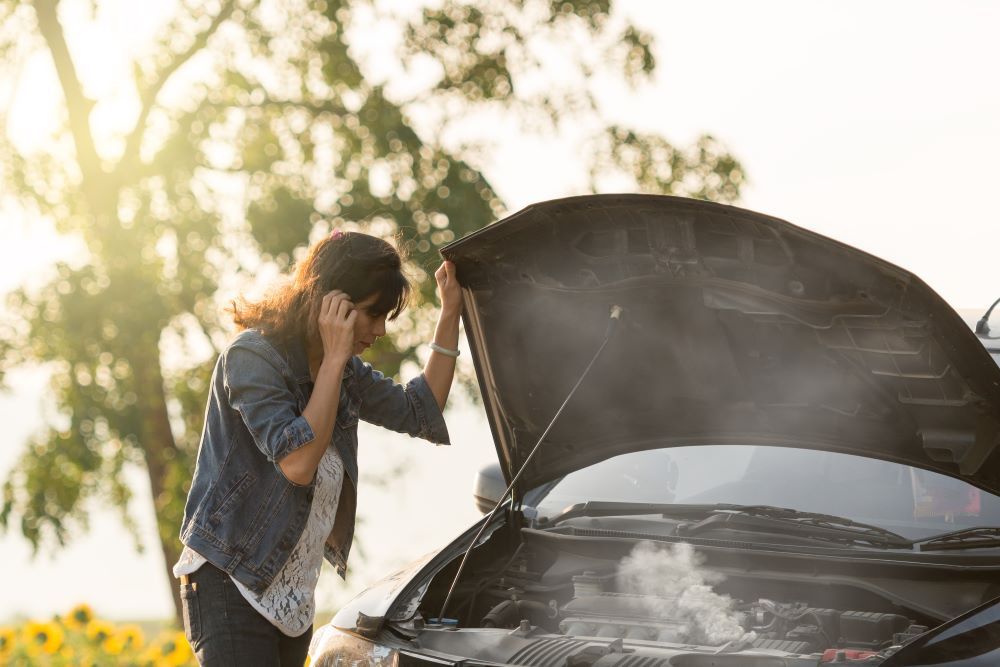 Lady looking down at overheating engine
Lady looking down at overheating engine
What Causes Overheating When AC Is On?
There are a few causes of vehicle overheating when the air conditioner is running. Namely, cars experience this issue when there is:
- A faulty fan, cooling motor, or another part related to the fan
- A faulty sensor for the engine coolant
- A bad water pump
- An overload in the air conditioning compressor
- A radiator leak or blockage
- A condenser that isn't regulating its temperature well
- Low freon level
However, most overheating issues when the AC is on are a result of a malfunctioning fan or fan part.
What Are The Symptoms Of A Car Overheating When AC Is On?
A few tell-tale signs indicate that your vehicle could be overheating while the AC is running.
Sometimes, an overheated vehicle isn't apparent until it's too late, when it becomes dangerous to drive, and repairs need to be done. So, always pay attention and keep up with regular maintenance on your car.
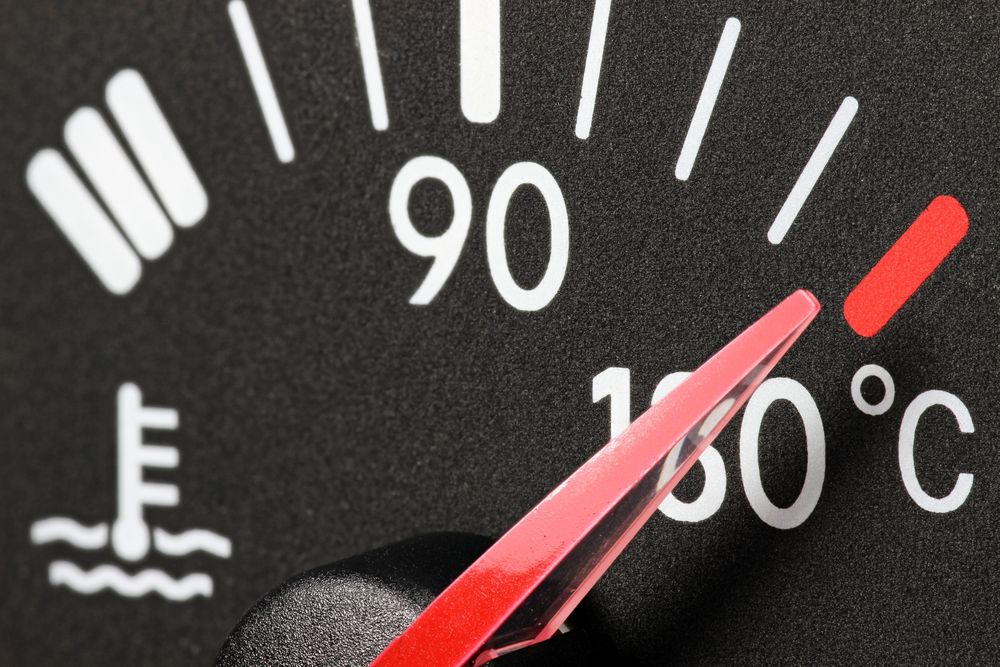 Gauge displaying a high engine temperature
Gauge displaying a high engine temperature
Temperature Gauge Goes Up When Air Conditioner Is On?
A rising temperature gauge is obvious that the engine is overheating.
When you run your car's AC, check the temp gauge or warning temperature gauge to see if the coolant is above-normal temperature.
If you aren't familiar with the gauge, you can find it on your dashboard, usually next to the odometer and other gauges.
It will look like a circle with a temperature symbol and an "H" and "C" with a hand and lines. The closer that hand gets to the "H," the closer your engine is to overheating.
Any temperature above 220 degrees Fahrenheit is too hot for an automobile engine.
A Cloud Of Steam Coming Out From Under The Hood?
If you notice steam rising from under the hood of your car, you need to check on the engine. The engine is likely overheating and may shut off soon when this happens.
This is vapor (steam) and not smoke, although it may look like smoke. In the event of smoke coming out of your engine, you should turn off your car and exit it immediately to get to safety.
But steam occurs due to the engine coolant liquid evaporating when it gets too hot or leaks.
If this is the case, you may need to get one or more repairs done, such as a radiator hose replacement or refill on your coolant.
 Steam escaping from radiator
Steam escaping from radiator
Car's Interior Components Feel Hot?
Have you noticed that the interior parts of your car start to warm up or feel hot when you've been running the AC for too long?
Your seats and their upholstery, dashboard, and other components inside the vehicle may feel hot to the touch.
Your car may be overheating if this starts happening while the AC is on.
Car Engine Shuts Down?
This is one of the most obvious signs of something wrong with your car or car engine.
If the engine shuts down, it could be due to an overheating problem, especially if you've run the AC for a prolonged period of time when it's hot outside.
Because vehicles have a temperature gauge for the engine to ensure it doesn't overheat, it will likely shut off automatically as an act of preservation.
Why Does My Car Overheat When The AC Is On And Idling?
Now, let's explore why a car might overheat while using the AC in an idling position. Radiator problems are some of the most common causes that make your car overheat when idling, but not when driving.
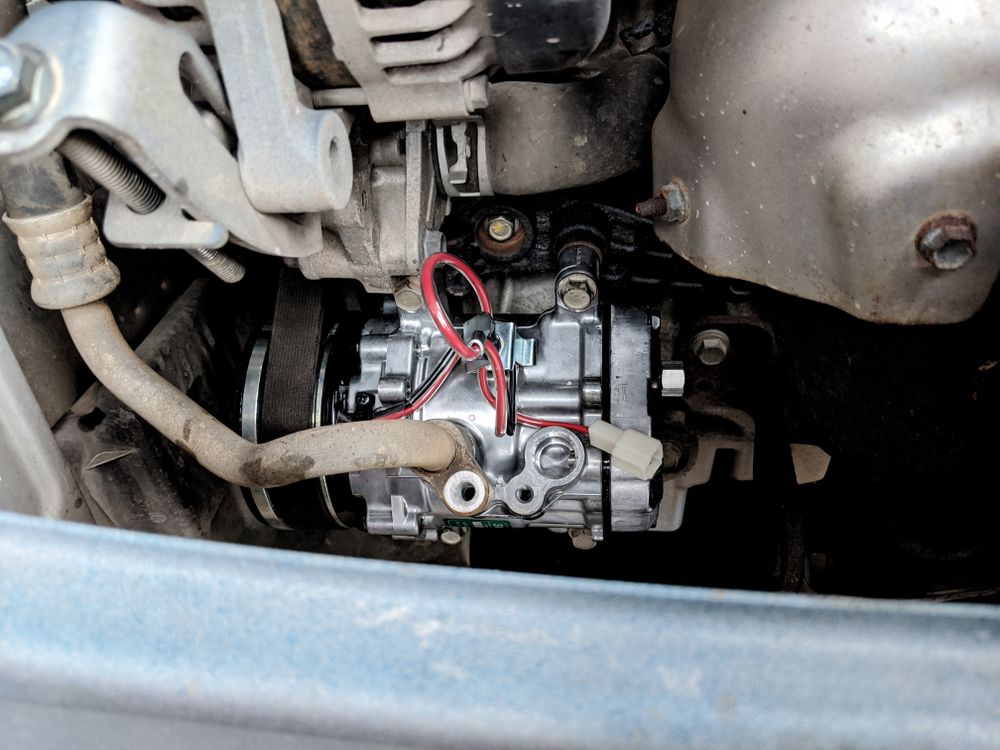 Car AC compressor
Car AC compressor
AC Compressor Overload
First of all, you might be dealing with an AC compressor overload.
The AC compressor is responsible for funneling refrigerant through the car's air conditioning system. It also turns the low-pressure refrigerant into a high-pressure refrigerant.
Can A Bad Air Compressor Cause A Car To Overheat?
A bad or faulty air compressor may cause your car to overheat, although indirectly, because it puts a strain on the vehicle's engine.
Because the engine has to work harder to make up for that loss of power, it simply gets too hot in some cases.
What Are The Symptoms Of A Bad AC Compressor?
Typically, you'll notice that your AC compressor needs to be fixed if you start to feel warm air coming from the AC vents.
This symptom may also be accompanied by a squealing or grinding noise coming from the AC system.
Other symptoms related to a bad AC compressor include reduced airflow from your car's AC vents, rattling/clunking noises from the AC, and difficulty turning on the AC.
How Do I Test My Car Compressor?
You can test your car's AC compressor by stopping, parking your vehicle, and applying the emergency brake.
Once you do so, turn on your car's AC and use a pressure gauge to measure the AC compressor on its underside. You'll find the compressor under the hood of the car.
Next, you'll add Freon to test whether the compressor kicks on as a result or doesn't.
Listen for a click followed by some soft rumbling noises to know that the AC compressor has kicked on.
If it does, that's likely not the source of your engine overheating problem in your vehicle.
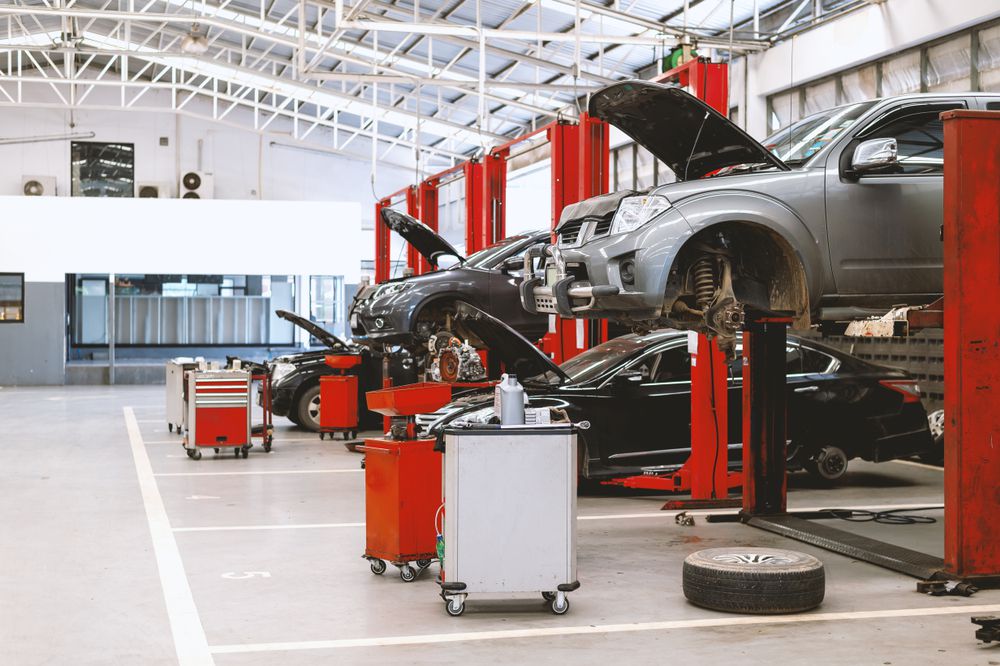 Cars being worked on in the shop
Cars being worked on in the shop
How Much Does It Cost To Replace An AC Compressor In A Car?
According toRepairPal estimates, it costs an average of about $270 (parts and labor combined) to replace an AC compressor in a car.
The cost can be broken up into the average labor cost ($185) and the average cost of parts ($85).
But depending on where you live, this cost could vary. Consider these replacement cost estimates based on a few popular vehicle models across the United States:
Table describing AC compressor replacement cost
|
Columbus, OH |
Madison, WI |
Los Angeles, CA |
Dallas, TX |
Burlington, VT |
| 2010 Toyota Corolla |
$945 (parts + labor) |
$945 (parts + labor) |
$1,000 (parts + labor) |
$990 (parts + labor) |
$890 (parts + labor) |
| 2010 Ford F-150 |
$820 (parts + labor) |
$820 (parts + labor) |
$860 (parts + labor) |
$855 (parts + labor) |
$775 (parts + labor) |
| 2010 Honda CR-V |
$965 (parts + labor) |
$965 (parts + labor) |
$1,035 (parts + labor) |
$1,030 (parts + labor) |
$885 (parts + labor) |
The cost of AC compressor repairs and replacement jobs also varies depending on whether or not you pay for labor.
If you are a certified mechanic or know one personally, you could get the labor for free and only pay for parts.
Furthermore, you may pay less if you have to get your AC compressor repaired rather than entirely replaced by a mechanic.
Bad Cooling System
Another possible cause of a vehicle overheating when it's idling with the AC on is that you have a faulty cooling system.
One or more parts related to this system may be broken or completely bust:
- Freeze plugs
- Thermostat
- Water pump
- Radiator
- Cooling fans
- Pressure cap
- Heater core
- Hoses
- Overflow tank
The cost to repair or replace these parts will vary, but parts like hoses tend to be much more affordable than the cooling fan. For example, cooling fans can cost about $225, depending on where you live and the relative auto labor rates.
Can Low Freon Cause Overheating?
One particular part of the cooling system that's essential is the Freon (the refrigerant). This gas is responsible for regulating the temperature of the cooling system.
Freon will go low in the AC system even when there aren't any noticeable leaks.
So, low levels of it may dysregulate the system's temperature and lead to overheating.
In extreme cases, your car may be out of Freon entirely, which is the situation that is more likely to lead to overheating.
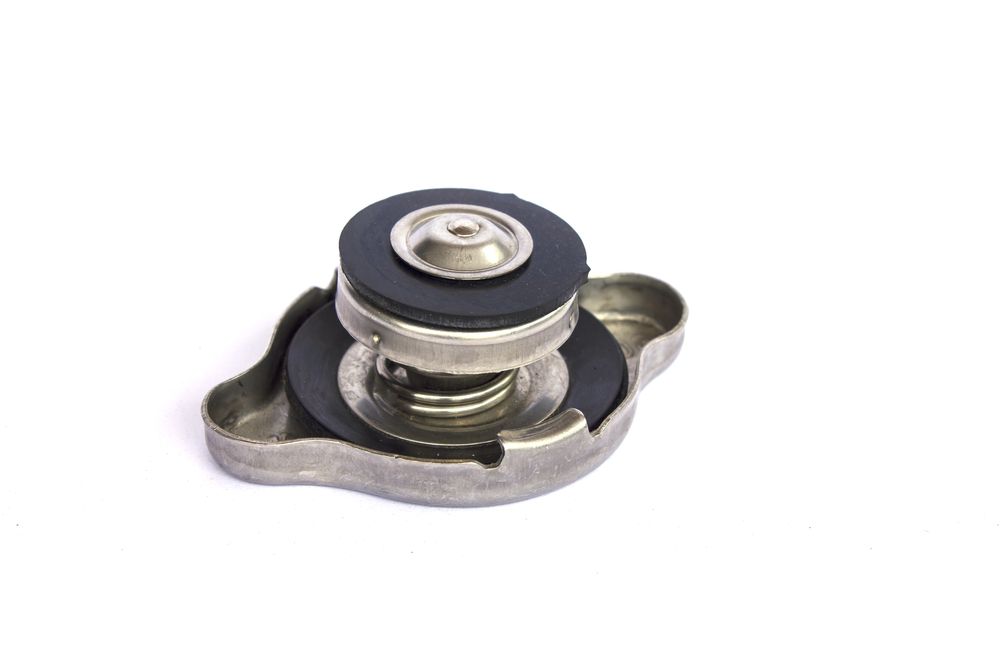 New radiator cap
New radiator cap
Issues With Radiator
Furthermore, a bad radiator can make your car overheat when the AC is turned on while idling. This is because the radiator regulates the cooling system by removing waste heat from the engine.
You need to ensure that your radiator has sufficient coolant levels, a working cap, and zero leaks.
Leaks are a common problem, and you can fix them in a pinch with tapes or clamps, but these aren't long-term solutions.
Furthermore, you want to make sure that the radiator isn't experiencing issues with getting clogged. Dirt can build up within the radiator parts and cause them to malfunction.
A clogged radiator can cause the engine to never properly cool down, but it can be fixed by flushing the radiator.
Otherwise, your car will likely end up overheating when the AC is running.
Faulty Fan
If the fan in your cooling system is defunct, then your vehicle will work overtime and overheat the engine.
This is especially true if you're idling or barely moving - like in traffic or sitting in a parking lot - with the AC running.
The interior of the car gets overheated, too, and as a result, the cooling fan can't keep up and do its job of regulating the engine's temperature.
Whether it's the fan itself, its motor, clutch, or another part that makes it function, a faulty fan will lead to faulty temperature regulation in the car.
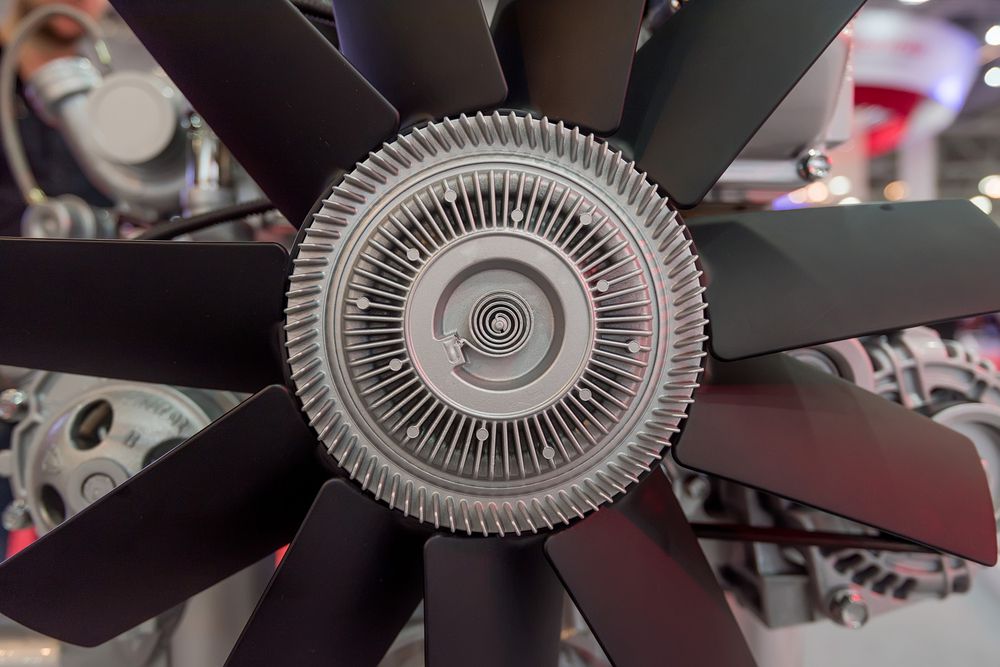 Car engine fan
Car engine fan
Defective Engine Coolant Sensor
The coolant in your engine is important in keeping your car from overheating. After all, the name has the word "cool" right in it.
If you're running the AC in an idling car, the vehicle may overheat if your coolant sensor doesn't work.
The sensor sends a signal to the electronic control module in the car, but if the sensor is broken, it sends the wrong message.
When this happens, the overall cooling system doesn't work as it should and can't keep the car from getting overheated. So, having a good coolant and a good coolant sensor is key to a temperature-regulated vehicle.
Faulty In-Vehicle Components
Aside from the cooling system problems that can cause a car to overheat when the AC is on, other in-vehicle components need to work properly.
To avoid overheating your vehicle, you want to ensure that other parts under the hood - such as the head gasket - are in working order.
Or, perhaps your vehicle's thermostat doesn't work properly anymore. This could lead to poor or inaccurate coolant flow and an overheated engine.
Even bad fan belts and malfunctioning water pumps can cause issues with overheating in many vehicles.
You won't know until you check under the hood, and even then, you may need a mechanic's expert input to clear things up.
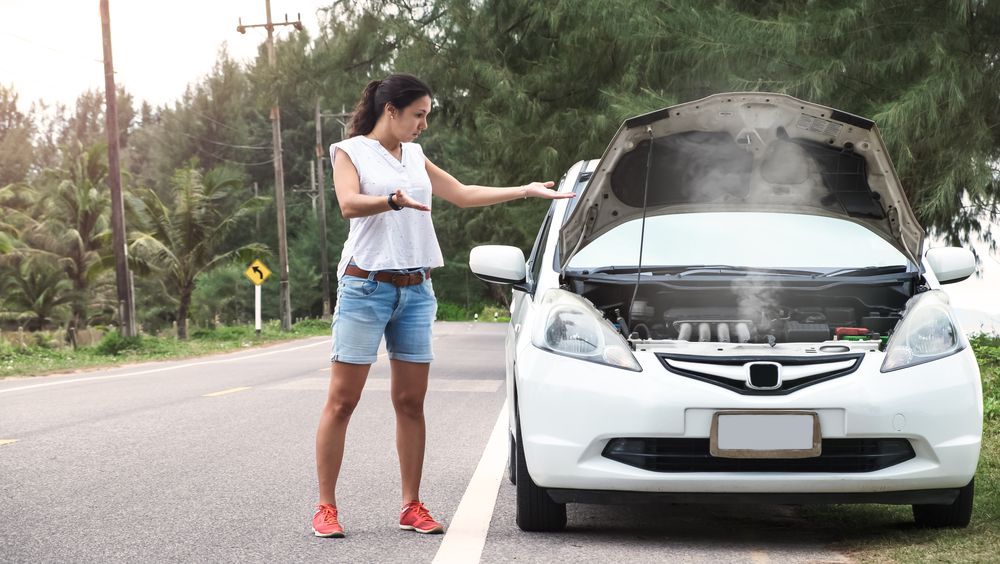 Overheated car on the side of the road
Overheated car on the side of the road
What To Do If Car Overheats With AC On In Traffic
Sitting in bumper-to-bumper traffic is one of those situations where it's more likely that your car will overheat.
This is especially the case if it happens to be hot outside and you have to keep the AC on to keep the sun from baking you through the vehicle's windows.
So, if you find that your car is overheating when the AC is on and idling, you should take the following steps for safety.
Warning: Don't try to open the radiator cap while the engine is still hot! You will get a severe steam skin burn!
1. Pull Over
First, pull over onto the shoulder or the designated area of the road for emergencies if possible.
But wait until you have an opportune window to do so, putting on your turn signal or your hazard lights, so other drivers know you need to move out of the traffic lane.
Once you've safely pulled over, put your car into park.
2. Shut Off The AC
The next thing you want to do to remedy the situation is turn off your car's AC unit.
The longer you leave it running, the hotter your car will get and the worse the problem will become.
If you can turn off the AC in your car before you even get a chance to pull over, that is the most ideal course of action.
3. Inspect Under the Hood
Next, you'll want to get out of your car when it's safe to do so and pop the hood to let it cool off faster.
You don't want to start inspecting things under the hood right away because an overheated vehicle will be extremely hot under there.
Instead, wait for any engine steam to stop rising and hold your hand over the area to test the temperature.
4. Turn Off The Engine
To safely inspect the parts under the hood, you should also turn the engine off but keep the key in the ignition so it's on "mode."
5. Determine The Cause Of Overheating
Next, you can inspect different parts to see where the overheating problem is mainly coming from.
It could result from a faulty fan, as we mentioned earlier.
But to know for sure, locate the fan under the hood and see if it's still running (if working correctly, it should keep running when your key is in the ignition but not turned on).
If this is the case, you'll need to get your car to a mechanic ASAP or get a tow truck to take you to one for a fan replacement.
Otherwise, you might be dealing with a coolant leak that needs to be fixed. If this is the case, you're probably also dealing with a low coolant level situation.
In this case, you need to patch up any leaks on the radiator hose that you can find and refill it with new coolant and some water.
If you aren't confident that you can handle these DIY repairs on your own, you should get a tow, call your roadside assistance service, or get your car to a mechanic as soon as you can manage to.
Conclusion
Have you ever wondered why does my car overheat when the AC is on? If you've ever noticed that your engine overheats and, in worst-case scenarios, shuts down, you may be running your AC while one or more parts are faulty.
Whether it's low levels of Freon, a malfunctioning AC compressor, a faulty cooling fan, a coolant leak, radiator issues, or another issue, this is a problem that shouldn't be ignored.
If you find yourself stuck in traffic, idling with the AC on, and your car overheats, you should pull over and assess the situation as soon as possible. Take precautions and let your car fully cool down before inspecting or touching anything under the vehicle's hood.
FAQ
We aim to provide the most useful answers to your pressing questions about the topic. Learn about thermostat, freon, and compressor issues that can affect your car in an overheating situation.
Can The AC Make Your Car Overheat?
Technically, your car's AC unit is not the direct cause of the car overheating.
However, various car components interact with the AC unit that can work too hard or become ineffective when the AC is running a lot or when the car is idle.
The main problem is that the AC compressor (a crucial part of the AC) takes some of its functional power from the car's engine.
And if you take away that power from the engine, the engine has to meet higher expectations to keep the car running, thus overheating it.
Can A Bad AC Compressor Cause A Car To Overheat?
Yes, a bad AC compressor is one of the leading causes of cars overheating while the AC is running.
What happens is that the AC compressor may be malfunctioning or faulty, causing it to perform below par. When this occurs, its clutch is technically working but not well enough for the compressor to fulfill its duties.
If this happens, it puts a big strain on your vehicle's engine, and it only intensifies the longer you run the AC unit.
Is It Bad To Start Your Car With The AC On?
Because the AC compressor draws some of its power from a vehicle's engine, it does put a slight strain or extra pressure on the engine.
But starting your car and then immediately turning on the AC (or having the AC settings already switched "on" when you start the car) isn't going to necessarily hurt the engine.
If anything, you might hear or feel some vibration as you turn the ignition over, but it's not technically bad. Further, most modern models of vehicles are equipped to handle that kind of power usage when you start your car.
Can A Bad Thermostat Cause AC Not To Cool?
No, the vehicle's thermostat does not have to do with the AC unit and its ability to cool. Rather, the thermostat regulates coolant movement in and out of your radiator and engine.
Therefore, even if you have a bad vehicle thermostat reading incorrectly and affecting the coolant flow, your AC will likely still work. There are, however, other issues that can cause the AC not to let out cool air.
Can Low Freon Cause Car To Overheat?
Yes, low Freon levels (low refrigerant levels) can cause a vehicle to overheat since the compressor runs out of refrigerant to compress.
Without this essential process working properly, the engine gets too hot, and problems ensue.
Getting the freon level of your AC system requires special tools and is usually best left to a mechanic.